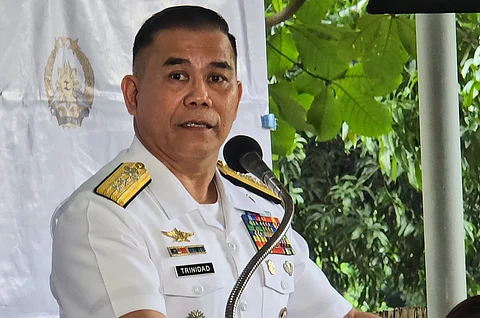
- NEWS
- the EDIT
- COMMENTARY
- BUSINESS
- LIFE
- SHOW
- ACTION
- GLOBAL GOALS
- SNAPS
- DYARYO TIRADA
- MORE

Amid rising tensions in the West Philippine Sea (WPS), the Armed Forces of the Philippines (AFP) clarified its role in ongoing maritime operations, asserting that while the Philippine Navy does not directly participate in civilian aid missions such as “Kadiwa para sa Bagong Bayaning Mangingisda,” it maintains an active and sustained presence in disputed waters like Bajo de Masinloc (Scarborough Shoal).
In a press briefing at Camp Aguinaldo, AFP spokesperson for the WPS, Rear Admiral Roy Vincent Trinidad, addressed recent concerns over military involvement in civilian-led missions such as the "Kadiwa para sa bagong mamamayang mangingisda" initiated Philippine Coast Guard (PCG) and Bureau of Fisheries and Aquatic Resources (BFAR).
"Let’s first be very clear on this. The mission of the PCG and BFAR is to support our fisherfolk… That is a law enforcement support operation. That's a law enforcement action of these agencies of government to support our fisher folks,” Trinidad stressed.
"The AFP, the Philippine Navy, and the Philippine Air Force regularly conduct maritime patrol operations and air surveillance flights in Bajo de Masinloc, the Northern Islands, Benham Rise,” he added. “There is no conflict in both statements. We have our respective mandates to perform.”
Trinidad’s clarification follows remarks by National Maritime Council (NMC) spokesperson Undersecretary Alexander Lopez that Philippine warships would be excluded from the convoy of PCG and BFAR operations in Bajo de Masinloc (Scarborough Shoal).
"Yes, simply because this is an activity that is designed to provide Kadiwa or support for our fisher folks,” said Trinidad.
He, however, assured the AFP’s continued presence and vigilance in the country’s maritime territories.
“This Kadiwa initiative is civilian in nature, thus warships are not deployed with them. But that doesn’t mean we’re not present in the area,” Trinidad said.
Trinidad, stressed the Philippine Navy, along with the Air Force, regularly patrols the vicinity of Bajo de Masinloc, the Northern Islands, Benham Rise, and the Kalayaan Island Group.
“The AFP has never left the vicinity of Bajo de Masinloc, the Northern Islands, Benham Rise, and even Kalayaan Island Group,” he emphasized.
“The regular patrol plans of the Philippine Navy, the Air Force under Northern Luzon Command, and Western Command are there. The details of which, the when, the where, we leave it up to the operational commanders. But I would like to assure the Filipino people, rest assured, your AFP is there,” he added.
When asked about possible support in crisis scenarios—particularly if a Philippine civilian vessel is harassed or endangered, Trinidad said the AFP operates under detailed contingency plans coordinated by unified commanders of the Northern Luzon and Western Commands.
“All the actions of the different government agencies are synchronized by the unified commanders, whether Northern Luzon Command, Western Command or the other unified commands,” he said.
“We have contingencies in place for any eventuality, and the details of the reactions of the unified command, we leave it up to the unified commander level,” he further stressed.
On speculation that the Navy would “stand down” in future aggressive incidents, Trinidad was firm in rebuttal.
"That assumption is false. I stated it very clearly; it is a universal mandate. The spirit of any sea-going individual, any professional organization is to extend assistance to any person requiring help in the ocean, in the maritime domain, regardless of country, regardless of flag. And we have proven that in the past, not only for our Filipino citizens,” he said.
Trinidad emphasized that while AFP may not be visible in all operations, it remains on standby.
“It has been proven in the past. We respond regardless of the weather. In fact, in many times in the past, it's only the AFP that responded during inclement weather to provide assistance to our Filipino kababayans,” he said.
